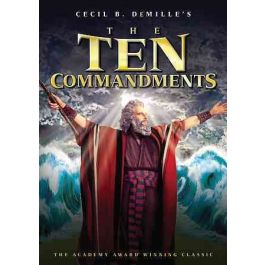It’s March 1973 and I’ve just gotten my very first eye exam. The eye doctor dilates my eyes, which is unfortunate because we’re about to have a special afternoon watching The Ten Commandments at a movie theater. I wasn’t born yet when it came out originally in 1956. All I know is that my mom says it’s special and even my dad’s mom, Grandma from West Los Angeles (GFWLA) as I refer to her was driving down to watch it with us. That was special. I didn’t see her often. I see my mom’s mom, my FAVORITE grandma, Grandma from Tustin (GFT) on a daily basis as she is my before and after school care.
As my mom, dad, brother, GFWLA, and myself cram into our green Oldsmobile Delta-88, my vision starts to clear. As it turns out, I wouldn’t need glasses for 40 years. If only I had my eight-year-old eyes now. We park outside the Orange Cinedomes, a complex of domed theaters, very modern for 1973. My mom has smuggled in bags of candy. She’s pressed dad to quit smoking and pour out his alcohol but apparently thinks it’s ok to bring in black market snacks.
We buy an obligatory bucket of popcorn and some Coke, maybe to help ease my mom’s guilty conscience. The entire theater smells of popcorn as we shuffle down a sticky aisle floor to find seats in the middle. I’m sitting between my mom and GFWLA. The movie starts and I’m mesmerized. It’s a Hollywood take on what I’d been learning about in Sunday School. But Moses looks a lot like the guy in Planet of the Apes.
It’s a great story. A big story based on a historical story, with a lot of little stories within. And since I’m an avid reader and even a bit of a beginning writer, I’m hooked.
On the way home, GFWLA tells us she heard the parting of the Red Sea in the movie was done using Jell-O. My dad busts out laughing which made all of us laugh, even GFWLA. She meant to say the special effects people used gelatin, but she’s also the one that sent my dad to the store when he was a boy to fetch “Byardi Sauce.” When he couldn’t find it, she dragged him to the store by his ear and pointed out Chef Boy-Ar-Dee sauce. That partially explains his parenting skills, I guess.
Movies in those days were epic stories told with impressive musical scores, special effects, and top-level actors. While most Americans had black and white TVs, movies enabled us all to have an immersive, emotional experience.
I’m reminded of that now, on this Saturday night as I sit in my hotel room at the Hampton Inn in Wytheville, VA. I’m driving down to Virginia Beach and decided to break the ten-hour journey in half. I’m tired from the drive and there’s nothing on TV so I’m writing this while watching The Ten Commandments in the background. I guess it’s playing because it’s Palm Sunday Eve.
The acting is over the top. The special effects dated. The story has serious flaws, historical and biblical, but it’s still a great story. And a great story is always better than any special effects or soundtrack. Great stories are timeless. The actors in The Ten Commandments have all long since passed away, but they bring the story to life in American, English, and various other accents.
“So let it be written. So let it be done,” orders Yul Brenner in a slight, Russian burr.
My trip to Virginia Beach is part of my farewell tour, I guess. I’m speaking at the Virginia State SHRM Conference for the final time. I’ve been doing this one for about six years now. It’s one of my favorites. The topic is How to Improve HR’s Reputation Through Storytelling. I’ve used stories in all my work. It brings the concepts to life.
But storytelling can also change narratives. It’s the reason I’m reaching out to HR folks for this. HR’s reputation at times, well, sucks frankly. It’s panned on TV shows and movies. It’s the topic of conversation when anyone starts bitching about work. The good HR does is often overshadowed by perceptions of incompetence, lack of confidentiality, and general apathy toward employees. Those perceptions lead to stories. We’ve all heard the HR stories, haven’t we? The closed door. The phone that never gets answered. The voicemail that never gets returned. The gossip that emanates from there. The more these stories are told, the more stories are revealed.
The only way to fight back is to tell a better story. An accurate one. HR does far more good than harm. I’m going to teach them how to change things by developing and sharing better stories.
Stories can help you too. They build connections on an emotional level. That’s far deeper than any PowerPoint presentation can do. It’s why we can remember stories our grandparents told us decades ago but can’t remember one thing the CEO said in the Town Hall meeting this morning.
I don’t really have a story, so to speak, this week. But maybe this is what we all need. A story about the importance of stories.
What will your story be about today?

